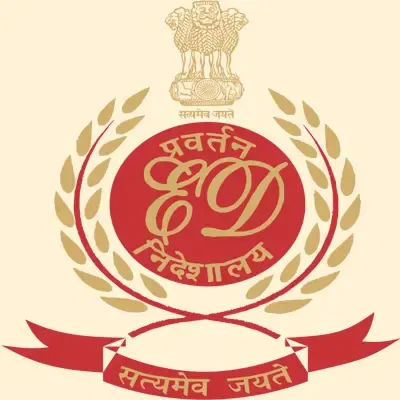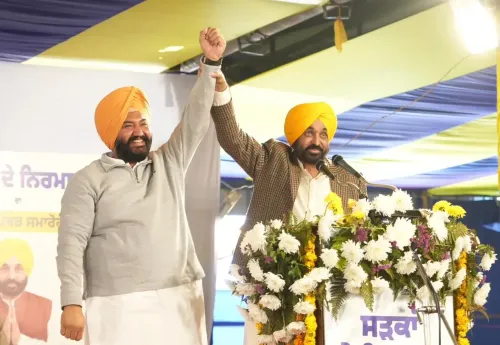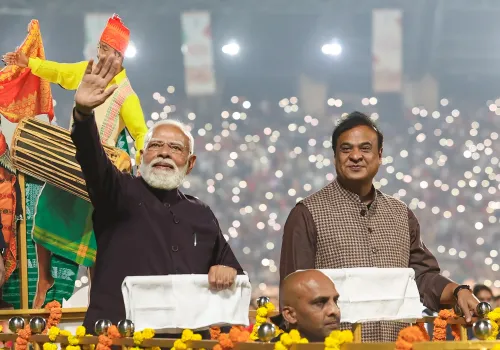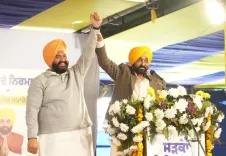Year-End Review: Mahayuti's 2024 Triumph Challenges MVA, Fadnavis Government Prepares for Future Hurdles
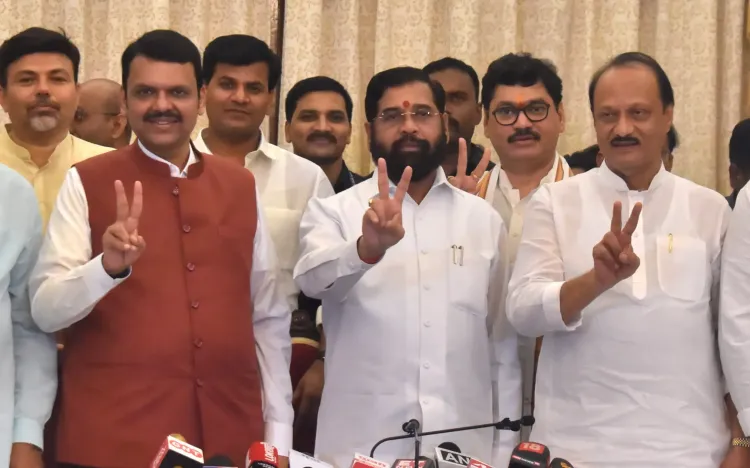
Mumbai, Dec 30 (NationPress) The Mahayuti, a coalition of BJP, Shiv Sena, and NCP, struck gold in 2024 with a stunning victory in the Maharashtra Assembly elections, rebounding from a lackluster performance in the Lok Sabha polls. The BJP not only reestablished its dominant role in the grand coalition but also secured the chief ministerial position, which it had given up in June 2022 when Eknath Shinde revolted against Uddhav Thackeray.
The Maha Vikas Aghadi, which had previously outmaneuvered the Mahayuti in the Lok Sabha elections, faced a total defeat in the Assembly elections. The MVA now confronts a significant challenge to maintain the coalition's relevance and, more importantly, to keep its parties—Congress, Shiv Sena UBT, and NCP(SP)—cohesive while attempting to revive their fortunes in the upcoming five years.
The Mahayuti not only overcame the anti-incumbency sentiment but also united effectively to turn challenges into opportunities through a remarkable display of solidarity. Following a poor showing in the Lok Sabha elections, the BJP adapted its strategy for the Assembly elections, collaborating closely with its allies, Shiv Sena and NCP, to reclaim power in Maharashtra, a key state known for its dynamic role in political, financial, and social spheres.
The RSS, which had been quiet during the general elections, mobilized its organizational resources to assist the BJP in emerging as the largest party and achieving a significant victory for the Mahayuti. The BJP aims to accomplish its ambitious target of 'Shat Pratishat' (winning power independently) in the 2029 elections, as stated by Home Minister Amit Shah during the Assembly campaign.
Conversely, the MVA, despite winning more seats in the Lok Sabha elections, could not replicate that success in the Assembly elections, primarily due to internal conflicts, egos, and a failure to present a compelling and cohesive plan to voters, alongside their inability to adjust their campaign strategies in light of inter-caste and community tensions.
Despite facing financial difficulties in agriculture due to a growing disparity between production costs and market prices for crops like cotton and soybean, along with rising instances of farmers' suicides and unrest related to reservations in the Maratha, OBC, and Dhangar communities, the MVA could not outperform the Mahayuti. In contrast, the Mahayuti effectively implemented a range of welfare and development initiatives, including the controversial Ladki Bahin Yojana, which were executed with meticulous planning.
Specifically, the BJP succeeded in consolidating OBC support while reaffirming its commitment to Maratha reservations. This was despite intense protests by activists demanding reservations for Marathas, OBCs, and Dhangars. The pro-Maratha activist Manoj Jarange Patil had previously benefited the MVA in the general elections, yet his influence did not extend to the Assembly elections.
The Mahayuti faces a crucial test regarding the contentious reservation issue, as Patil has announced plans for renewed protests, and OBC leaders are mobilizing against perceived threats to their reservation rights following the exclusion of Chhagan Bhujbal from a ministerial position.
The brutal rape and assault of two minor girls in a private school in Badlapur, Thane district, rattled the state, inciting protests from the opposition and various organizations who blamed the Mahayuti government for the deteriorating law and order situation. The opposition also condemned the police's handling of the encounter with the main suspect in the Badlapur case, but the Mahayuti defended the actions as necessary in response to an attack on police.
Notably, the issue of crimes against women did not receive adequate attention during the campaign, despite Eknath Shinde's prior assurances of stringent measures. The Mahayuti government must demonstrate its commitment to tackling crimes against women through effective enforcement of the Bharatiya Nyay Sanhita, especially as the Centre seeks input on the need for the Shakti Act to combat such offenses.
The collapse of the Chhatrapati Shivaji Maharaj statue in Malvan, Sindhudurg district, provided the opposition with ammunition to accuse the Mahayuti of corruption and haste in contract awarding. However, Prime Minister Narendra Modi quickly issued an apology, reiterating the significance of Chhatrapati Shivaji as a national icon. The opposition failed to sustain momentum on this issue during the campaign, and although Uddhav Thackeray promised to build a Chhatrapati Shivaji temple in every district, this did not resonate with voters.
The Mahayuti's promises of welfare and populist initiatives garnered substantial support from beneficiaries. Despite opposition criticism, the Mahayuti adeptly promoted welfare economics aligned with its political objectives.
While the MVA had pledged financial assistance of Rs 2,100 per month for eligible women and free public transport, these promises fell flat as 2.34 crore women had already received Rs 7,500 (Rs 1,500 monthly) for the July-November period. To combat youth unemployment and skill shortages, the Mahayuti initiated a training program with a monthly stipend, appealing to young and first-time voters. In contrast, the MVA's promise of a Rs 4,000 monthly allowance for educated unemployed individuals remained unrealized.
Despite the Mahayuti's reliance on handouts and 'revadis' contributing to its substantial victory, it has imposed additional strain on the state's economy. The fiscal deficit has surpassed Rs 2.30 lakh crore, while public debt is projected to exceed Rs 8 lakh crore, limiting capital expenditure and market fundraising opportunities. The opposition argues that some welfare programs, including the Ladki Bahin Yojana, may face cuts or closure. Nevertheless, Chief Minister Devendra Fadnavis and his deputies have assured that the state can sustain these initiatives while maintaining fiscal discipline.
Despite challenges, Maharashtra continues to be a premier investment destination, ranking first in foreign direct investment (FDI) for two consecutive years, 2023-24 and 2024-25. The state attracted Rs 1,25,101 crore in FDI in 2023-24 and maintained its lead in the first half of 2024-25 with Rs 1,13,236 crore, representing over 90% of last year’s total.
The government must actively pursue accelerated infrastructure development, including roads, highways, metro systems, river linking, and a water grid worth over Rs 5 lakh crore. Additionally, it must take necessary measures to boost the Mumbai Metropolitan Region's turnover from $140 billion to $300 billion by 2030.
However, in light of increasing competition from other states, the Mahayuti government needs to enhance the ease of doing business by implementing strict single-window clearance processes, eliminating bureaucratic obstacles, and ensuring policy consistency.
As Maharashtra approaches 2025, the Mahayuti government faces criticism from the opposition and various organizations over the tragic murder of a young sarpanch, Santosh Deshmukh, in Beed district, and the death of a Dalit youth, Somnath Survanshi, in Parbhani. Although CM Fadnavis has declared a zero-tolerance approach, it's crucial for the Mahayuti to translate this into tangible action.
(Sanjay Jog can be contacted at sanjay.j@ians.in)


